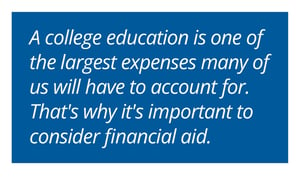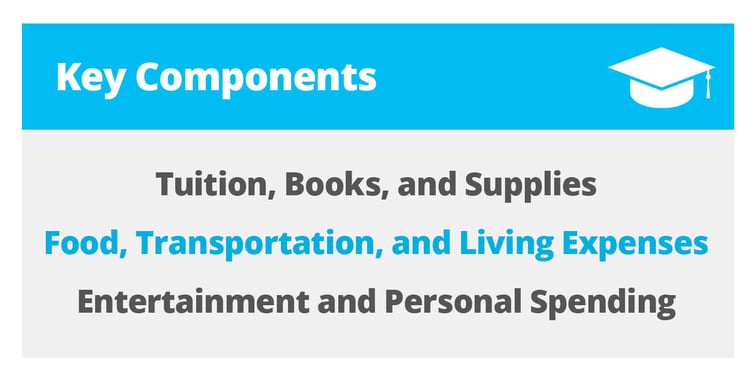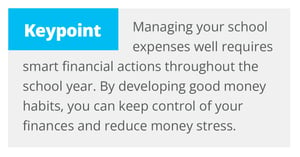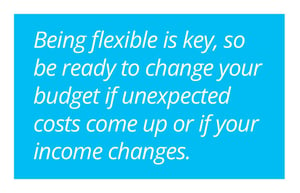Table of Contents
With a new school year comes new opportunities and lessons to learn. It also comes with certain expenses that you'll need to keep in mind. A strong financial plan is necessary to manage the costs of education, including expenses like textbooks, student housing, and maybe even a new car.
In this post, we'll guide you with some helpful tips and steps to help you through the financial planning process for handling your money during the school year. With strong financial planning, you can go into the academic year feeling prepared for each expense.
Navigating Student Finances

Managing student expenses calls for intentional planning and wise financial choices – especially when it comes to higher education. A college education is one of the largest expenses many of us will have to account for. That's why it's important to consider financial aid.
Exploring Financial Aid Options
Financial aid opportunities will play a significant role in your financial plan for school, especially if you don't have an existing college fund to help pay for tuition. Begin by looking into the different types available, like scholarships or loans, before you make a financial decision.
Scholarships and grants can be the best way to cover costs, as you don't have to repay them. Student loans can be helpful if scholarships and grants do not cover all your expenses. It is very important to choose loans carefully. You should look at different options, interest rates, and debt repayment plans before deciding on a loan.
Key Components of School Expenses
After sorting through your available financial aid, you can create a detailed look at the expenses you need covered. When you include these parts in your plan, you can see your finances clearly. Keep in mind that a financial plan is not set in stone, as your current financial situation can change.

Tuition, Books, and Supplies
It's important to account for the essentials and consider how your expenses might shift during the year. Some semesters will require a larger investment in books or supplies, and tuition fees could be different. A helpful tip is to find out the average cost of textbooks for your classes or ask older students for advice. Getting price quotes for textbooks and checking online stores can help you find the best deals.
Keep a running list of all the learning materials you need, and make adjustments at the start of the year, and again before the next semester. By setting aside funds for these main school costs, you can make sure you have enough money to handle important parts of your education.
Food, Transportation, and Other Living Expenses
Other key components of a comprehensive financial plan are living expenses, including food, transportation, and accommodations. Start by determining your housing situation for the academic year. Will you be living on campus in a dorm, sharing an apartment with roommates, or living independently? Research different housing options and their associated costs, considering factors like proximity to campus, amenities, and lease terms.
Meal planning is another crucial factor in personal finance. If you're on a tight budget, explore options like preparing meals at home or utilizing a meal plan at campus dining halls. Creating a weekly or monthly grocery budget and sticking to it can help you avoid overspending on food.
Commuting can also impact your budget. Calculate your expenses based on how you choose to travel. You might choose from options like public transportation, carpooling, cycling, or walking to cut costs. Remember to account for the costs of gas, insurance, parking, or public transportation passes when budgeting for transportation.
Entertainment and Personal Expenses
When creating financial plans, don't forget to include discretionary spending. Luckily, many students can use discounts for places like movie theaters, restaurants, and other activities. Use these discounts to make your money go further and enjoy more experiences while keeping your financial objective in mind.
Keep in mind that little expenses can add up quickly, but that doesn't mean you can't enjoy student life. You can save money by adopting habits like packing your lunch, going to free campus events, or finding cheap entertainment. Take advantage of campus resources like libraries, computer labs, and sports facilities to save money and expand your financial options.
Building Your Financial Plan

Now, it's time to establish your plan for financial success. Managing your school expenses well requires smart financial actions throughout the school year. By developing good money habits, you can keep control of your finances and reduce money stress.
Creating a Realistic Monthly Budget
Having a budget is a core component of any solid financial plan. The key here is that your budget should be realistic, so you're more likely to stick to it. Start listing out how much money you're making and where it comes from. This could be savings, money from a new job, financial help, or support from family. Add up your total income each month from these places to track your monthly cash flow.
Next, list out your fixed expenses. These are things like rent, utilities, and tuition that do not change much, then you can assess your variable costs. These include groceries, transportation, and school supplies. Make sure to cover your needs before your wants and save money where you can – even if it's just a little bit at first.
Developing Smart Spending Habits
Developing good spending habits is a great way to keep your finances stable and build a solid credit score while you are a student. It's important not to use credit cards too much for your expenses. High interest rates can trap you in credit card debt. Instead, set aside a certain amount of cash or use a debit card for these items. This way, you will spend within what you have in your checking account.
Many universities also have workshops or counseling services focused on financial literacy for students. These resources can give you valuable advice on budgeting, managing debt, and making smart money choices. With insights from a financial planner, you can boost your skills and get personalized tips.
Finally, consider opening a savings account for emergencies. Saving anywhere between $500 to $1,000 for emergency savings is a good goal to start with. That way your emergency fund acts as a safety net for any unexpected spending needs.
Budgeting Apps for Students
In today's digital age, many budgeting apps are made to help students with their financial life. These apps boost savings and help you manage your money easily. There are tools, like Goodbudget, where you can track your spending, create budgets, and set financial goals. This makes it simple to keep up with your finances.
You can link your bank accounts and credit cards to these apps within minutes. Then, you can track your income and expenses effortlessly. You can also organize your purchases so you can see how you spend money and where you can do better.
Many budgeting apps provide up-to-date info on your cash flow. This lets you watch your spending and change things when you need to. You can also set up payment reminders, which helps you avoid late fees and keeps your credit history in good shape.
Reviewing Your Financial Plan Throughout the School Year 
Checking your financial plan during the school year is crucial for getting closer to your long term financial goals. This helps keep your budget relevant to your financial situation. Set aside some time each month to look at your financial accounts, track your spending, and see how well your budget is working.
When you review your finances, compare what you earn and spend to your personal financial plan. Are you spending extra money or saving less in some areas? Being flexible is key, so be ready to change your budget if unexpected costs come up or if your income changes.
Addition Financial is Here for Every Financial Goal
Planning your money as a student is not only a smart idea for your finances now but can help you succeed later on. If you make careful choices and seek financial planning services for assistance, you can create a bright and safe financial future.
At Addition Financial, your goals are our top priority. We offer many tools to help you understand your choices better – whether you want to speak with a financial advisor or open a new account to help manage your finances. Get started and become a member today.



